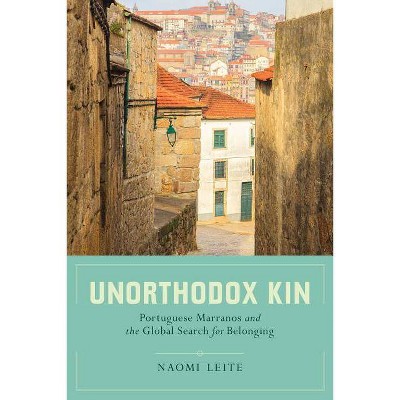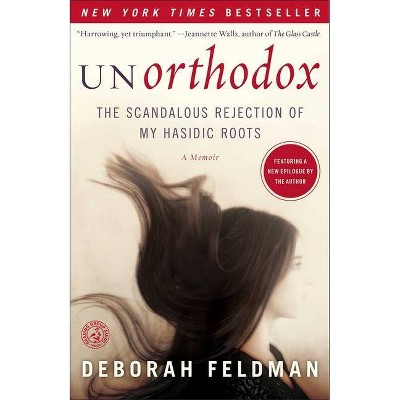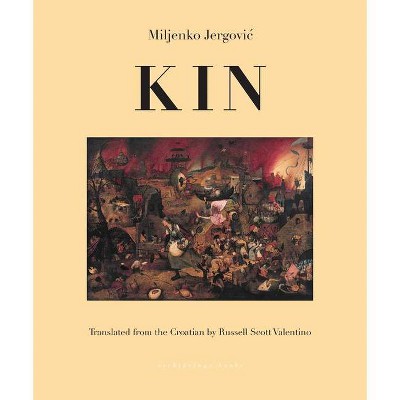Unorthodox Kin - by Naomi Leite (Paperback)

Similar Products
Products of same category from the store
AllProduct info
<p/><br></br><p><b> About the Book </b></p></br></br>"Unorthodox Kin is a groundbreaking exploration of identity, relatedness, and belonging in the context of profound global interconnection. Naomi Leite tells the gripping story of Portugal's urban Marranos, who trace their ancestry to fifteenth-century Jews forced to convert to Catholicism, as they come to understand their place within the Jewish world. Focusing on the work of imagination and face-to-face encounters between urban Marranos and Jewish tourists and outreach workers, Leite deftly examines how perceptions of self, kinship, and belonging evolve across local and global social spaces. An ethnography of affinities, the book maps diverse contexts and criteria by which people come to identify with a particular social category, the forms of interaction that give rise to alienation or affiliation, and practices through which some are made strangers and others kin. Beautifully written and methodologically innovative, Unorthodox Kin is a model study for the anthropology of kinship, tourism, religion, and globalization."--Provided by publisher.<p/><br></br><p><b> Book Synopsis </b></p></br></br>How are local understandings of identity, relatedness, and belonging transformed in a global era? How does international tourism affect possibilities for who one can become? <p/> In urban Portugal today, hundreds of individuals trace their ancestry to 15th century Jews forcibly converted to Catholicism, and many now seek to rejoin the Jewish people as a whole. For the most part, however, these self-titled Marranos ("hidden Jews") lack any direct experience of Jews or Judaism, and Portugal's tiny, tightly knit Jewish community offers no clear path of entry. According to Jewish law, to be recognized as a Jew one must be born to a Jewish mother or pursue religious conversion, an anathema to those who feel their ancestors' Judaism was cruelly stolen from them. After centuries of familial Catholicism, and having been refused inclusion locally, how will these self-declared ancestral Jews find belonging among "the Jewish family," writ large? How, that is, can people rejected as strangers face-to-face become members of a global imagined community - not only rhetorically, but experientially? <p/> Leite addresses this question through intimate portraits of the lives and experiences of a network of urban Marranos who sought contact with foreign Jewish tourists and outreach workers as a means of gaining educational and moral support in their quest. Exploring mutual imaginings and direct encounters between Marranos, Portuguese Jews, and foreign Jewish visitors, <i>Unorthodox Kin</i> deftly tracks how visions of self and kin evolve over time and across social spaces, ending in an unexpected path to belonging. In the process, the analysis weaves together a diverse set of current anthropological themes, from intersubjectivity to international tourism, class structures to the construction of identity, cultural logics of relatedness to transcultural communication. <p/> A compelling evocation of how ideas of ancestry shape the present, how feelings of kinship arise among far-flung strangers, and how some find mystical connection in a world said to be disenchanted, <i>Unorthodox Kin</i> will appeal to a wide audience interested in anthropology, sociology, Jewish studies, and religious studies. Its accessible, narrative-driven style makes it especially well suited for introductory and advanced courses in general cultural anthropology, ethnography, theories of identity and social categorization, and the study of globalization, kinship, tourism, and religion.<p/><br></br><p><b> From the Back Cover </b></p></br></br><p>"This book is a gem. Just as Malinowski produced ethnography of a single group that nevertheless spoke to universal problems of human existence, so too Leite's book speaks to profound contemporary problems of group identity, of how peoples with different interests conceive of others and themselves, and how they interact. <i>Unorthodox Kin</i> is written for scholars, but so beautifully and clearly that it will be accessible to a wide and divergent audience."--Edward Bruner, Professor Emeritus of Anthropology, University of Illinois</p> <br>"At a time of resurgent anti-Semitism in much of Europe, the passionate self-ascription and swelling numbers of Portuguese Jews both call for explanation. Naomi Leite's compelling analysis explores their conviction that, far from being new converts, they are recovering a mysterious past shared in varying degrees with the majority of Portuguese today, a past that until recently was tangible only through the most oblique traces. This book is a richly persuasive and precisely observed exploration of how collective belonging is excavated, realized, negotiated, and contested in life and thought."--Michael Herzfeld, Ernest E. Monrad Professor of the Social Sciences, Harvard University <p/><i>"Unorthodox Kin</i> is the best ethnography I have read about how an identity category is lived subjectively while also circulating as a charged figure of judgment and desire in the eyes of other people. A beautifully written book, full of empathy and humor."-- Rupert Stasch, Fellow and Director of Studies, Sidney Sussex College, Cambridge University <p/> "This engaging and lucid account of Portugal's crypto-Jews a century after their uncovering brings together anthropological perspectives on class identity in Portugal, heritage tourism, and Jewish religious practice. By focusing on histories of becoming, the author presents a truly innovative analysis not only of Judaism in Portugal but, more broadly, of how global communication and local history interact creatively in our contemporary world."--João de Pina-Cabral, Professor of Social Anthropology, University of Kent <p/> "An imaginative, engaging and absorbing account of Jewish kinship in the modern world; this will be a wonderful book for teaching as well as for reading."--Fenella Cannell, Associate Professor of Social Anthropology, London School of Economics<p/><br></br><p><b> Review Quotes </b></p></br></br><br><i>"Unorthodox kin </i>is at once the story of specific people and a community, of the history of a people and a country, and of the intricacies of recovering, acknowledging, and re-creating individual and group identity. Simultaneously, it is a story of spiritual life and daily practicalities, of intimacy and acknowledged tourism, a personal narrative and a finely tuned anthropological study."-- "Journal of the Royal Anthropological Institute"<br><br>"An incredibly thoughtful piece of scholarship innovatively charting new pathways for tourism scholarship and raising important questions about the meaning of belonging in our globalized world."-- "EuropeNow" (6/4/2018 12:00:00 AM)<br><br>"Like any indispensable ethnography, the book exceeds the specific topic, time, and geography of its long-term field research to address broader, all-important questions of social categorization, belonging, affinity, self, and identity... A valuable resource for students of anthropology, sociology, and religious studies.... Summing Up: Highly recommended."-- "CHOICE"<br><p/><br></br><p><b> About the Author </b></p></br></br><b>Naomi Leite </b>is Lecturer in Social Anthropology and Director of Studies in Anthropology of Travel and Tourism at SOAS, University of London. <br>
Price History
Cheapest price in the interval: 29.95 on November 8, 2021
Most expensive price in the interval: 29.95 on December 20, 2021
Price Archive shows prices from various stores, lets you see history and find the cheapest. There is no actual sale on the website. For all support, inquiry and suggestion messages communication@pricearchive.us




![Unorthodox Jukebox [LP] [PA]](https://pisces.bbystatic.com/image2/BestBuy_US/images/products/2079/20792143_so.jpg)















